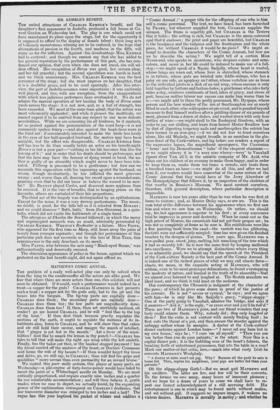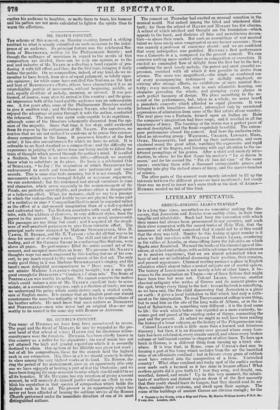MATHEWS'S COMIC ANNUAL.
THE problem of a really well-acted play can only be solved when from the king to the ca,ndlesnuffer all the actors are alike good. We fear that where there are more actors than one, this solution will not soon be obtained. If it could, such a performance would indeed be a treat—a supper for the gods CHARLES MATHEWS in fact presents such a treat ; a supper not for the gods only, but to the pit and the boxes into the bargain. The tip-top parts are capitally done— CHARLES does them ; the secondary parts are capitally done— CHARLES does them too ; the low parts are magnificently done, CHARLES does them too ! If, then, thou art mirthfully inclined, oh reader! go see honest CHARLES, and he will "fool thee to the top of thy bent." If thou dost think because gravity regulates the motions of the earth, it ought to regulate the motions of its in- habitants also, listen to CHARLES, and he will show thee that cakes and ale still hold their savour, and maugre the march of intellect, that "ginger is yet hot in the mouth." Art a lover of the sensi- bilities? dost like to smack the lemon in thy punch ?—CHARLES has tales to tell that will make thy right eye weep while thy left smileth. Finally, has thy tailor cut thee, or thy banker stopped payment? has thy friend carried off the mistress of thy heart, or Doctors' Commons sent home the wife of thy bosom ?—If thou wouldst forget thy loves and debts, go, we still say, to CHARLES; thou wilt find his quips and quiddities " more sovran than even parmacitty for an inward bruise." We visited this puer milk artium, this player of many parts, on Wednesday—a pile-engine of forty-horse-power would have failed to insert the point of a Whitechapel needle on Monday. We are most critically proportioned, and require exactly nine inches and a quarter for our comfortable accommodation ; and wilt thou believe it, gentle reader, when we rose to depart, we actually found, by the expanding power of the cachinnation consequent on CHARLES'S drolleries, that our transverse diameter was enlarged to ten inches and a half! The rogue has this year baptised his packet of whims and oddities a " Comic Annual ;" a proper title for the offspring of one who is him self a comic perennial. The text, we have heard, has been furnished by PEAKE ; but whoever supplied the text, CHARLES supplies the sermon. The frame is superbly gilt, but CHARLES iS the Teniers that it holds ; the setting is rich, but CHARLES is the many-coloured opal that it encloses ; the print and paper are beautiful, but CHARLES is the headpiece and the tailpiece and the frontispiece and the whole piece, for without CHARLES it would be no piece ! We might at- tempt to describe the characters of the Comic Annual, but how are we to describe the acting ? We might tell of a certain Miss Never-end, who speaks in monotone, who despises colons and semi- colons, and never in her life could be induced to make use of a full- stop :—we might speak of a Squire Sadjolly, whose heart is wasted, whose lungs are worn out, whose liver is shrivelled, whose stomach is in tatters, whose guts are twisted into fiddle-strings, who has a palsy on one side, an apoplexy on t'other, whose vertebrx are as loose as the individual joints in a dish of ox-tail soup, whose carcase is only held together by buttons and button-holes ; a gentleman who rides forty miles a!day, swallows continents of beef, lakes of gravy, and rivers of port, because neither labour nor excess can make him worse than he is :—we might add to these the portly gourmand, Mr. Dyspeps, whose person and the bow window of the inn at Southampton are so nicely fitted to each other, who soliloquizes onpie-crust, and is puzzled beyond measure to find himself restless after a piddling dinner of six pounds of meat, gleaned from a dozen of dishes, and washed down with only four bottles of wine:—we might stroll to the Zoological Gardens, with an order to pay our shilling, and learn from honest Mister Swallow how by dint of digesting tenpenny nails and marlinespikes the ostrich has been turned to an iron-grey :—if we did not fear to trust ourselves alone, like old Shakely, we might trundle in an omnibus to the glo- rious feast of the Cork-cutters, and lay before our readers a report of the expressive lapses, the magnificent aposiopesis, the Ciceronian " hems" and the Demosthenian " hahs" of the eloquent chairman :— or we might wherry it in "a wery nice wherry—werv" to Vauxhall (quasi dicat Vox all!) in the amiable company of Mr. Acid, who takes out his children of an evening to make them happy, and in order to keep them so, snubs them ten times a minute, and beats them a hundred times an hour :—we might do all this, and after we had done it, our readers would have somewhat of the same notion of the Comic Annual that they would have of the Jerry Abershaw of the Monopolylogue that follows it, by an inspection of the skeleton of that worthy in Brookes's Museum. We must content ourselves, therefore, with general description, where particular description is impossible. MATHEWS is now ten years older than he was when he was first at home to visitors ; and, as Master Dicky says, so are we. This is the sum total of the difference between his appearance when we first saw him and when we saw him on Wednesday. Or rather, we should say, his last appearance is superior to his first ; at every successive trial he improves in power and dexterity. When he came out as the high priest of Momus, his canonicals had not got their proper set ; he was not so completely at home as he now is. His exhibitions were like a fine painting fresh from the easel—the varnish was too glittering, the tints were not sufficiently mingled: time has now given the finished touches to the designs of genius. Ten years ago, MATHEWS was a new-pulled pear, sweet, juicy, melting, but smacking of the tree which it had so recently left : he is now the same fruit by keeping mellowed into excellence. Were we to attempt distinctions where every thing is so admirably good, we should say that the speech of the President of the Cork-cutters' Society is the best part of the Comic Annual. It is indeed one of the richest pieces of what we may call chaste farce— chaste, we mean, in the exquisite acting of MATHEWS, who will seldom, even in his most grotesque delineations, be found o'erstepping the modesty of nature, and farcical in the truth of its absurdity—that we almost ever listened to and laughed at. The Scotch anecdote we liked least, and we think it told least on the audience.
Our contemporary the Chronicle is indignant at the character of the puns ; of which he gives some dozen in proof of the justice of his censure. He is not " severe or cynical," he says ; and we agree with him—he is only like Mr. Sadjolly's gravy, "slippy-sloppy." One of the party going to Vauxhall, admires the bridge, and asks if it answers—" Ask it," is the reply, "or cross over and you'll be toll 'd." These are two of MATHEWS'S puns, and our friend wonders that any body could admire them. Why, nobody did ; they only laughed at them ! But the critic is not content with merely finding fault ; he first cuts the throat of a jest, and then swears the murder against the unhappy author whom he mangles. A doctor at the Cork-cutters' dinner exclaims against London hams—" I never eat any ham but in my own house," says he ; " I cure 'em all myself." "Then you use 'em better than you do your patients," is the retort. Now this is a capital dinner pun ; it is the bubbling over of the heart's fulness, the breaking forth of unbuttoned joyousness, that sets the table in a roar! Mark our matter-of-fact critic, now,—mark into what rusty Irish he converts MATHEWS'S Westphaly.
"A doctor at table won't eat pig. Why ? Because all the pork he eats is home fed. Then, replies his neighbour, your pigs are better fed than your patients."
Oh the slippy-sloppy Goth!—But we must quit MATHEWS and his cavillers. The latter are few, and few will be their converts.
To the former we owe many, many hours of innocent pleasure ; and we hope for a dozen of years to come we shall have to re- peat our honest acknowledgment of a still accruing debt. His entertainment is one in which may be found mirth without malice, and wit without gall. It suggests no impure images, it wakens no vicious desires. 'Yarrows is morality in motley;' and whether he excites his audience to laughter, or melts them to tears, his humour and his pathos are not more calculated to lighten the spirits than to warm the affections,



















 Previous page
Previous page